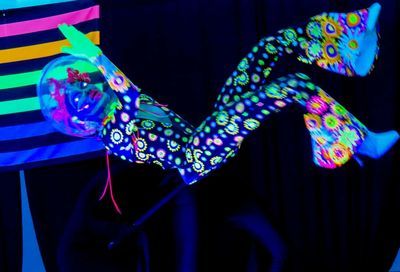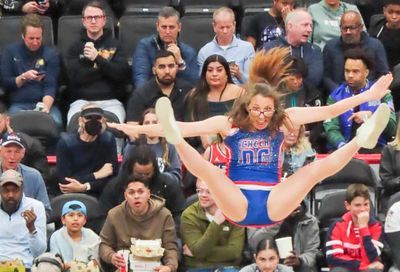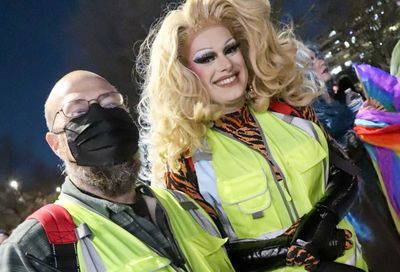Cruz Control
Wilson Cruz talks activism, politics and his commitment to Creating Change
MW: I think you were somewhat ahead of the curve in terms of this concept of actors and performers who are legitimately and actively involved in LGBT activism. During the New York marriage fight, it was clear that a corner had been turned and that many celebrities were involved. How do you see that process?
CRUZ: The more, the merrier. I welcome that. I welcome anyone who feels compelled to join this battle. When Gavin Creel started Broadway Impact and became as vocal as he did, I’m proud of him. I’m grateful for it.
I hope that, in some small way, I’ve modeled for people that it’s okay to do that, but I hope that what I’m really modeling is that it’s just not about putting your name on something. For me anyway, it’s not about, ”Hey, Wilson Cruz is for gay marriage.” Well, duh. But what is Wilson Cruz doing on the ground to make sure that that happens, beyond just putting his name on a host committee?
I like to get my hands dirty. I like to do the heavy lifting. That’s why I work with the Task Force, because I feel out of all of the organizations – the national organizations that are around – that they’re doing the heavy lifting. They’re doing the hard, grassroots work that really needs to be done – which is why I worked for them for a year and worked in Miami on the human rights ordinance and in Portland [Maine] and in Ann Arbor, Mich. I took a year off of my career because I felt that strongly about it.
MW: You have this odd experience of basically using national TV to come out. How did that change the process for you of moving forward in your career?
CRUZ: I’m not going to sugarcoat it in any way. It’s been a tricky road. And what I mean by that is that I had one of the most amazing experiences that anyone probably would have just out of the gate.
It was inevitable that whatever came after that was going to be somewhat disappointing. Especially in light of the fact that I was a young man of color who was out, and there were very few opportunities. And so I had at the time, and still do, have to walk into a room and convince people that I’m the right person for the job – despite what it is that they have in their head about some preconceived notion about who that person is. I have to state my case and convince people that, ”Hey, he doesn’t have to be white,” or whatever the case may be.
I got lucky in a lot of ways. I did a couple of small movies I felt strongly about – All Over Me and Johns – early on, and then I got to do Rent. Rent was life altering for me. I felt like all of my gifts were being used at the same time. I felt very much at home in that world. And it was extremely challenging at the time. I don’t know what made me think I could do it. It’s the naiveté of youth. I don’t know how I manifested that, but, ”Holla!”
MW: And playing a role that already had become a –
CRUZ: Oh, yeah, the balls. To call my agent at the time, and be like, ”I know he just won the Tony … but listen, I think I could do something really different with this and have my own spin on it.” And that’s literally what I said when I went in and met with Michael Greif. I said, ”I have no desire to copy with Wilson [Jermaine] Heredia did because Wilson Heredia is the best person to do what Wilson Heredia did. I am going to do this, and I hope you like that idea.” And he looked at me like I had three heads. I was 22 years old! And he said, ”I can work with that.”
All that’s to say, I got really lucky.
I still am in search of opportunities like that. In small ways, in big ways, I’m finding them. I think Noah’s Arc, even though it was a small audience, I feel like that was a huge opportunity to do and say something and convey something about being an HIV-positive person today and what that means in relationships. I felt like we did that really well.
MW: Even with Angel, though, that was a role that was another out person of color. Is there any role that you’ve gotten that you felt was changed to fit you more specifically?
CRUZ: I did a couple of episodes of The West Wing. It was a character who was C.J. Cregg’s assistant press secretary of domestic affairs. That’s how proud of it I am, I remember it.
I don’t think they really pictured who they got. The great thing about the first episode that I did, most of the episode was improvised because it was an episode that was shot as a documentary. Alex Graves, who was directing the episode, said, ”I want to do this thing where I’m interviewing a bunch of you guys, and I’m just going to speak to you as a documentary filmmaker. I’m going to ask you questions, and you make up the answers.”
I was like, ”Fuck, yeah!” I had already made up this back-story for myself, and he asked the magic question. He was like, ”How did you end up in this job?” And I just let him have it: ”I went to Howard University. I was writing letters to the administration about how they were dealing with GLBT issues.”
And when we cut, he was just like, ”Are you fucking kidding me? Just so you know, that is so in the show.”
For years, I was like, ”I have to get on there.” I was too young. What was I gonna do on there? Finally, I was old enough and the right thing came along and they brought me in, and I was like, ”Yes! Bring it!”
Now I feel that way about The Good Wife. I’m obsessed with that show.
MW: On the other hand, what is the worst experience you’ve had when being out or being a person of color has really made it more difficult or impossible to get a part?
CRUZ: That’s a harder question. I haven’t really had a horrible experience. And, here’s the thing: Nobody’s gonna come out and tell me, ”Hey, the reason why you didn’t get this job is because you’re gay or you’re Puerto Rican.” But I know it’s happened. Just like I know at times I didn’t get the job because I wasn’t the best person or the right person. It’s just reality.
I can’t really answer that question in a specific way because I’m not privy to that information, so it would be me guessing – and we don’t want to do that.
Support Metro Weekly’s Journalism
These are challenging times for news organizations. And yet it’s crucial we stay active and provide vital resources and information to both our local readers and the world. So won’t you please take a moment and consider supporting Metro Weekly with a membership? For as little as $5 a month, you can help ensure Metro Weekly magazine and MetroWeekly.com remain free, viable resources as we provide the best, most diverse, culturally-resonant LGBTQ coverage in both the D.C. region and around the world. Memberships come with exclusive perks and discounts, your own personal digital delivery of each week’s magazine (and an archive), access to our Member's Lounge when it launches this fall, and exclusive members-only items like Metro Weekly Membership Mugs and Tote Bags! Check out all our membership levels here and please join us today!





















